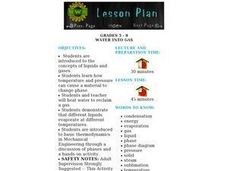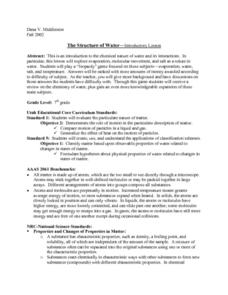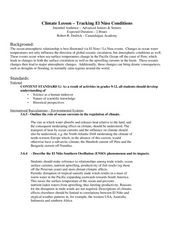Curated OER
Active Wear
Students interpret and analyze data. In this middle school mathematics lesson, students conduct an experiment in which they investigate which solar collector, black, white, or silver, absorbs the most heat. Students examine the graphs...
Curated OER
Review For Weather Quiz 2
In this science worksheet, students look at the information carefully in preparation for a formal assessment. The focus is upon defining different aspects of air masses.
Curated OER
Water Into Gas
Learners investigate how temperature and pressure cause a material to change phase. They heat water to reclaim a gas. They demonstrate that different liquids evaporate at different temperatures.
Curated OER
Electrical Energy
Students conduct an experiment to find out how well different wires radiate heat when voltage is applied across the wire. They use the results of their experiments to consider how the gauge of the wire and the type of wire affect the...
Curated OER
Climate Patterns across the United States
High schoolers articulate differences between climate and weather using examples in a written statement. Using climate data from across the country, they describe climate patterns for various parts of the United States on a map. Students...
Curated OER
Recreating the Greenhouse Effect
Students recreate the greenhouse effect. In this environmental science lesson, students gather materials and follow procedures to create the greenhouse effect on a small scale.
Curated OER
Water and Ice
Students observe and discuss the change of water to ice and back again. For this water and ice lesson, students observe the change in temperature and what happens when water freezes and turns to ice and vice versa.
Curated OER
Climate Change
In these science worksheets, 5th graders explore aspects of weather and recycling. In the first instructional activity, students are given five questions about weather which they match to the statement about weather that corresponds to...
Curated OER
Microbe Experimentation: Sour Milk
Sixth graders design and conduct an experiment with milk to investigate how temperature affects bacteria growth. They, in groups, construct a hypothesis, perform the experiment and then record and present the results.
Curated OER
Atmospheric Processes -- Convection
Students work together to discover how temperature changes can affect the density of water and air. They make predictions on what they believe is going to occur. They answer questions to complete the activity.
Alabama Learning Exchange
Amazing Adaptations - Probing Pinnipeds
Fourth graders collect data about the habitats of pinniped adaptations using digital probes. They determine how pinnipeds make adaptations to their natural environment by completing an experiment to determine how human and pinniped...
Curated OER
Hot Friction
Sixth graders use small electronic devices known as thermistors to measure the temperature beneath an object such as a coffee cup as it slides across a surface. By choosing different surfaces, 6th graders can compare in a quantitative...
Curated OER
Hot and Cold Colors
Students engage in an activity that will allow them to observe that hotter conditions can speed up changes in materials. They will predict whether food coloring disperses more quickly in hot, cold, or room temperature water, and then...
Curated OER
Quiz: Weather Terminology #1
In this science worksheet, 3rd graders focus on the weather. Students respond to ten fill in the blank questions regarding specific terminology used in weather.
Curated OER
Solubility
Fifth graders determine the difference between a soluble and an insoluble solution and how to increase solubility. They make a saturated solution using solvents at different temperatures.
Curated OER
Environmentally Friendly Home
Young scholars discuss ways to make homes more environmentally friendly. They comprehend ways to reduce home resource consumption, such as passive solar heating, insulation, and geothermal heating and cooling
Curated OER
Evaporation and Condensation
Students explore how temperature affects the processes of evaporation and condensation.
Curated OER
Hypothermia on the High Seas
Students identify and present the effects on humans when the body temperature falls, demonstrate and explain how the body loses heat, and understand hypothermia and cold water survival techniques.
Curated OER
The Chemical Nature of Water
Seventh graders simulate a Jeopardy game to examine the chemical nature of water. Among the topics featured are evaporation, water, salt, and temperature. finally, as review, 7th graders answer a battery of questions presented by the...
Curated OER
Air Masses
Learners are given maps depicting two or more air masses and they then categorize bodies of air by temperature and moisture characteristics. They recognize large regions of similar type air. Students are given a map of air temperatures...
Curated OER
Charles's Law
In this Charles's Law learning exercise, students review the Kelvin temperature scale, how volume varies with temperature, and Charles's Law. This learning exercise has 4 problems to solve.
Curated OER
What Makes you Hot?
Learners manipulate different variables in a model and make inferences about the temperature on Earth. In this heat lesson students calculate the blackbody radiation of an object at a certain temperature.
Curated OER
Tracking El Nino Conditions
Students identify major changes in ocean temperatures during an El Nino season. In this climate lesson students complete an Internet assignment using datasets to determine periods of El Nino.
Curated OER
Solar S'Mores
Students see that solar energy is the energy given off by the sun. They explain that when light energy is absorbed by objects it is changed to heat energy and that dark-colored objects absorb more light and store more heat from sunlight.

























